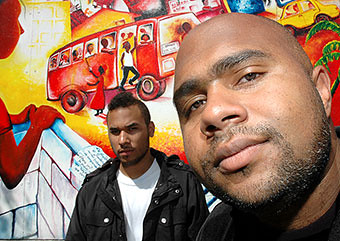
(originally published on XLR8R)
Souls of Rap Folks: Talking From The Heart
by Tomas Palermo
“Before the music was known all across the map/We use to do a little thing with this thing called rap/So take it back/Take it back”
Critical Akklaim, “Take It Back”
When emcee Critical Akklaim (a.k.a. Dorian Johnson) speaks of “taking it back” on Souls of Rap Folks' new album And This Too Shall Pass, it’s a call to contemporary hip-hop’ers to not only remember the music’s historical roots, but more importantly, to wrest control from those who are exploiting rap. And best believe, Johnson sees this as a People’s movement. Along with partner in rhyme, emcee Sin (Arsenio Ogilvie), Johnson views their mission as one that celebrates the glory of rap culture and its people by creating and performing music that embodies love, passion, community, and social concern.
“Music, particularly for Black people, is reflection their everyday life and their culture,” Johnson explains. “The trends I see in rap music are the same trends I see in society and politics, as relates to race and class.” Johnson’s cognizant message is evident on songs like “Seize The Day,” where he raps, “Leave the game alone/But the money is tremendous/Keep my agendas/Don’t have to pretend us/Endeavor’s gonna have to last forever/But I’m too clever to get locked up/Glocked up/Or my new girl knocked up/The Man thinks he can out-box us/Keep your fist tight/Nothing can stop us!”
SoRF’s conscious dictums are not surprising considering the duo’s activist backgrounds.
Both Johnson and Ogilvie have spent years in the non-profit youth development field, running music and entrepreneur programs for kids from impoverished or at-risk backgrounds. Both have successfully helped dozens of youth–who would otherwise fall though capitalism’s cracks–launch careers and businesses. “Many of my attitudes on society and politics are based around my interactions and educational work in the Bay Area over the last 11 years,” Johnson relates.
“With the Bay Area’s increasing gentrification, particularly in San Francisco and Oakland, I’ve seen how poor and working class Black and Brown people are socially and economically reduced, and many are criminalized or incarcerated. For those left, there’s not much to do, which is why we have so many problems. There is also a serious fear of Black and Brown men, including teenagers.”

Johnson cites California State Proposition 21 (which increased penalties for juvenile crime) and the recent S.F. and L.A. gang injunctions as measures that have harshly targeted and stigmatized youth of color. At the same time, major corporations have flooded the radio and music outlets with rap that reflects mainly the worst aspects of urban life, reinforcing distorted perceptions about youth. Souls of Rap Folks music–even the group’s name (an allusion to W.E.B. DuBois’ book, Souls of Black Folks, published in 1903!)–aims to educate and inspire young people to take control of their lives and culture.
“[Hip-hop] culture has become a commodity,” says Johnson. “The music is overall less stimulating or inspiring. Souls of Rap Folks are about edutainment (education and entertainment). The entertainment is what will allow [our music] to be discovered by the mainstream, but its educational quality is what will make it useful for both fans of rap music and for those that would like to use it for the common good.”
SORF see themselves as not merely “conscious indie rap” or hyphy “street rap” but somewhere in the middle. Likewise, And This Too Shall Pass contains songs that appeal to the entire spectrum of hip-hop heads. The group is committed to delivering a message, while being unique and creative, and aims to reach the streets without being limited in the conventions of trends in street music.
“There’s a new paradigm shift in the mainstream towards conscious and alternative music, I see a window of opportunity for the Souls of Rap Folks.”
Souls of Rap Folks And This Too Shall Pass is out now.
